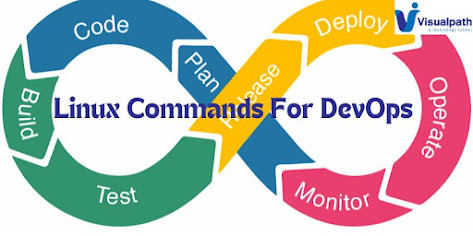Linux Commands For DevOps
In the realm of DevOps, where the fusion of development and operations leads to rapid software delivery and enhanced collaboration, proficiency in Linux commands is indispensable. Linux, as the backbone of many server environments, offers a plethora of powerful commands that streamline various DevOps tasks, from server management to deployment automation. -DevOps GCP online Training in hyderabad
ssh (Secure Shell):
The ssh command allows
DevOps professionals to securely access remote servers for configuration,
maintenance, and troubleshooting tasks. With ssh, one can establish encrypted
connections to remote machines and execute commands remotely, facilitating
seamless server management across distributed environments. -GCP
DevOps Online Training
grep (Global Regular
Expression Print):
grep is a versatile
command-line utility used for searching text patterns within files or streams.
DevOps engineers often leverage grep to parse log files, analyze system
outputs, and extract relevant information. Its powerful pattern-matching
capabilities make it an invaluable tool for debugging and monitoring tasks. -GCP
DevOps Training
rsync (Remote Sync):
rsync is a robust file
synchronization tool commonly used in DevOps workflows for efficient data
transfer and backup operations. With rsync, DevOps teams can synchronize files
and directories between local and remote systems while preserving file
permissions, ownerships, and timestamps, thereby simplifying tasks such as
deploying application updates and maintaining data consistency. -GCP
DevOps Training in Hyderabad
awk (Aho,
Weinberger, and Kernighan):
awk is a powerful text
processing tool that allows DevOps professionals to manipulate and analyze
structured data efficiently. With its rich set of features, including pattern
matching, text transformation, and mathematical operations, awk is widely used
for tasks such as data extraction, reporting, and system monitoring in DevOps
pipelines. -GCP DevOps Online Training Institute
sed (Stream Editor):
sed is a command-line
utility for performing text transformations on input streams. DevOps practitioners
often use sed in conjunction with other commands or scripts to automate
repetitive tasks, such as editing configuration files, replacing text patterns,
and modifying file contents programmatically. -DevOps
On Google Cloud Platform Online Training
curl (Client URL):
curl is a command-line
tool for transferring data to or from a server using various protocols,
including HTTP, HTTPS, FTP, and more. DevOps teams utilize curl for tasks such
as testing API endpoints, downloading files, and performing HTTP requests
within automated scripts or workflows. -GCP
DevOps Training institute in Ameerpet
tmux (Terminal
Multiplexer):
tmux is a terminal multiplexer
that enables DevOps professionals to create and manage multiple terminal
sessions within a single window. With tmux, one can split the terminal screen,
detach and reattach sessions, and share sessions across multiple users,
enhancing productivity and collaboration in DevOps environments. -GCP DevOps Training in Ameerpet
Visualpath is the Best Software Online
Training Institute in Hyderabad. Avail complete Gcp DevOps Online Training worldwide.
You will get the best course at an affordable cost.
Attend Free Demo
Call on
- +91-9989971070.
WhatsApp: https://www.whatsapp.com/catalog/919989971070

.jpg)


Comments
Post a Comment